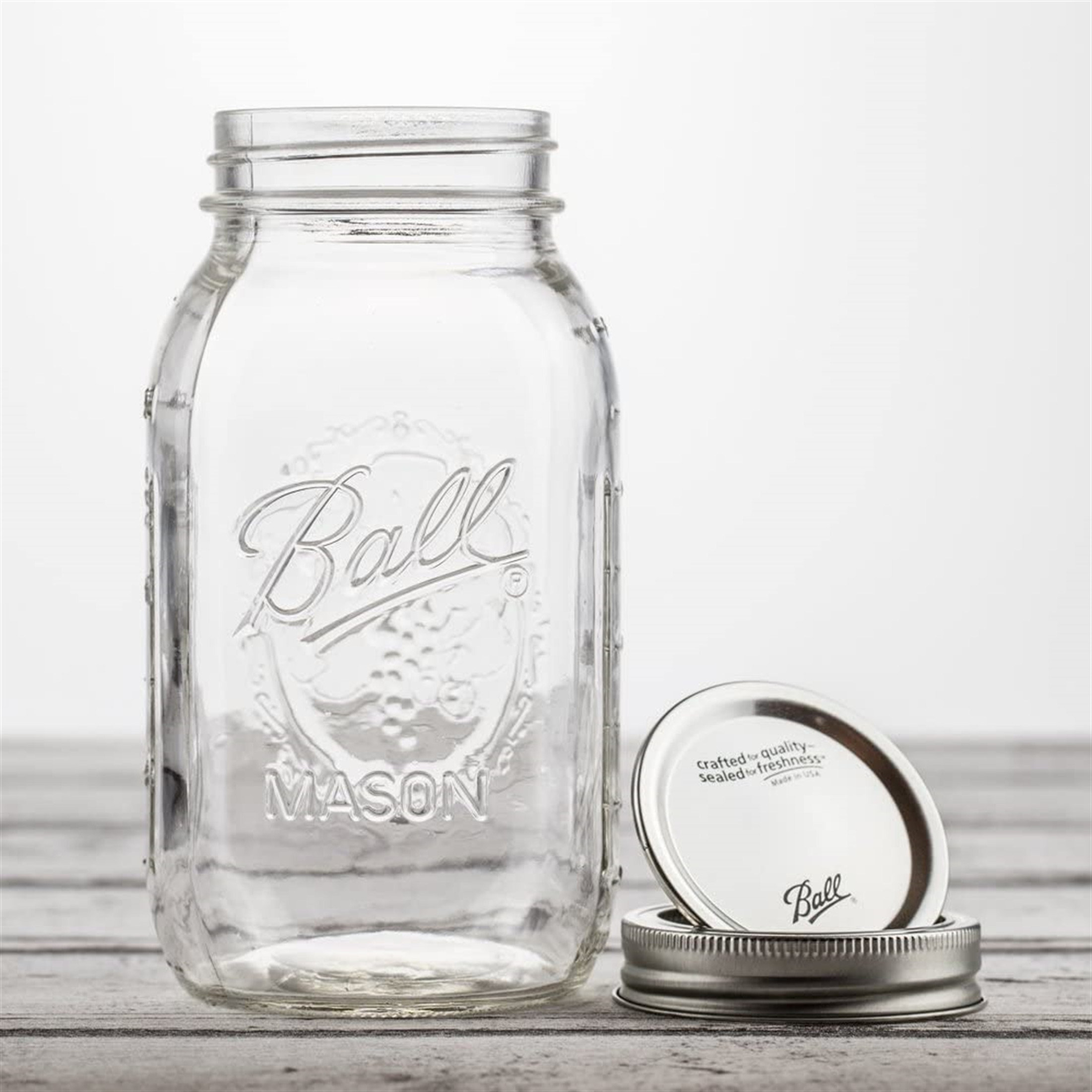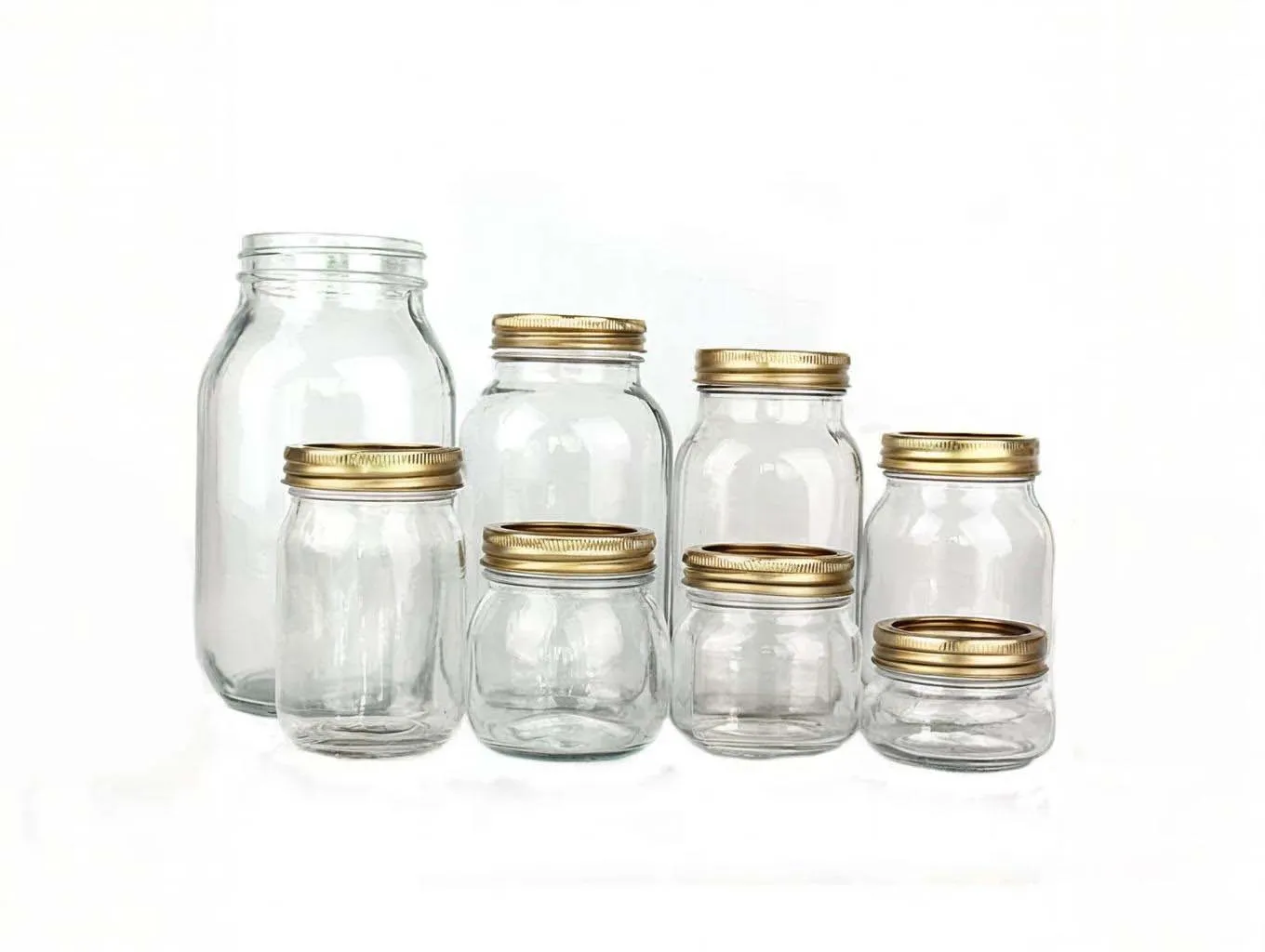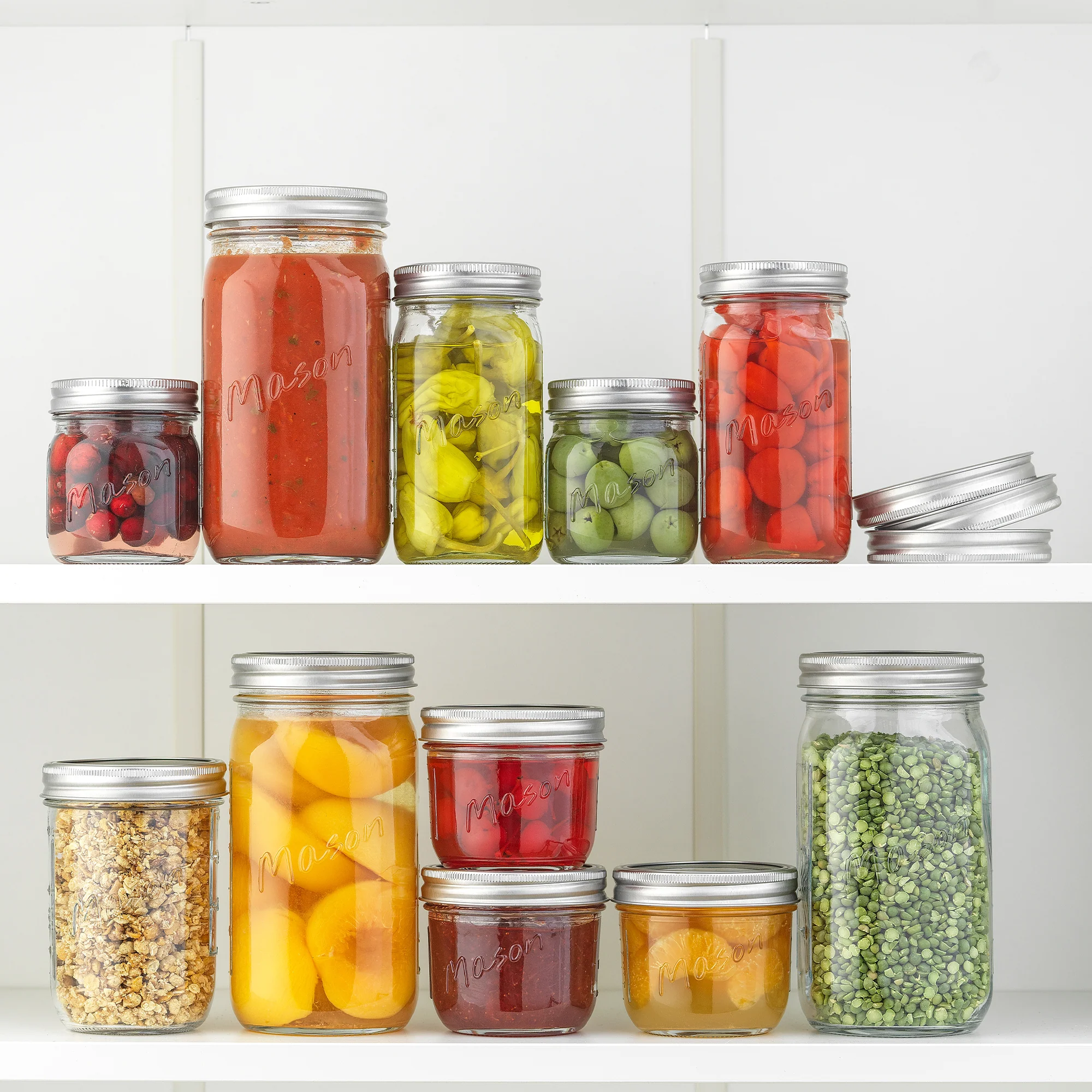In every home, the search for practical, reliable, and versatile storage solutions is a timeless pursuit. Over the years, countless storage options have come and gone—plastic bins that crack over time, metal tins that rust, and fabric baskets that collect dust—but one type of container has stood the test of time, evolving from a functional necessity to a beloved staple in households, restaurants, and even creative spaces: glass jars.
Take the mason jar—that classic Glass Jar your grandma probably used for jams and pickles. It might seem old-school, but it’s quietly become a go-to for keeping things fresh, organized, and looking good. Whether you’re storing grains, meal prepping, or just trying to reduce kitchen clutter, these humble jars have a way of making everyday storage feel a little smarter—and a lot nicer.

Table of Contents
What Is A Mason Jar?
A mason jar is a sturdy, thick-walled glass jar with a screw-threaded neck. What makes it special is its clever two-part lid system: a flat metal disc with a rubber sealing ring, and a separate band that screws on over it. When tightened, these pieces work together to create an airtight vacuum seal—perfect for preserving food.
This practical invention came from John Landis Mason back in 1858. His design revolutionized home food preservation, making it safer and more effective to extend the shelf life of fruits, vegetables, and more—long before refrigerators became commonplace.
Common Sizes and Features
You’ll find mason jars in a range of sizes, from small 4-ounce jars all the way up to large half-gallon (64-ounce) ones. They typically come in two mouth styles: regular and wide-mouth, offering flexibility depending on what you’re storing.
A standard quart-sized jar, for example, stands about seven inches tall with a diameter around three and a half inches. The opening usually measures roughly 2.75 inches across. One handy feature many people appreciate is the measurement markings etched right on the glass—making it easy to measure ingredients without extra cups or spoons.
More Than Just Canning
While mason jars are famous for canning jams, pickles, and produce, their uses go far beyond the pantry. They’re incredibly versatile—great for storing dry goods, organizing kitchen tools, crafting, making candles, or even serving drinks. Their durable, heat-resistant glass stands up to repeated use, which is why you still see them in kitchens today, just as often as in DIY projects.
A Lasting Legacy
It’s no exaggeration to say mason jars helped shape American home cooking and preservation culture. They symbolize practicality and self-sufficiency. In fact, archaeological digs—like one at Fort McCoy—have uncovered thousands of canning-related artifacts, many of them mason jar fragments. That’s a testament to how widely used they were.
Well-known brands like Ball began producing these jars in the late 1800s, and they’ve remained a familiar sight ever since. Whether you’re canning, organizing, or crafting, there’s a good chance a mason jar is exactly what you need.

Different Types Of Mason Jars And Their Sizes
I love using mason jars for storage because they come in so many types and sizes. This variety makes them a great fit for preserving food, doing crafts, or organizing my home. Here’s my practical breakdown to help you choose the right mason jar for your needs.
A Guide to Common Sizes and Their Uses
Jelly Jar (4 oz / ½ cup):
Best for jams, jellies, spices, or small condiments. These little jars are ideal for gifts, tasting samples, or portion control.Half-Pint (8 oz / 1 cup):
In my opinion, this size is great for preserves, pickles, or yogurt. I also use it to store spices and small amounts of dry goods. Both Regular Mouth and Wide Mouth options are available.Three Quarters Pint (12 oz / 1¼ cups):
Perfect size for sauces, dressings, or snack portions. You often find these with Regular Mouth openings.Pint (16 oz / 2 cups):
This size is very flexible. I use it for canning fruits and veggies, making salads, or preparing overnight oats. It comes in both mouth types.Pint and a Half (24 oz / 2½ cups):
You’ll often find this size with a Wide Mouth. It’s my go-to for storing bigger food items, layered meals, and making cold brew coffee.Quart (32 oz / 4 cups):
Ideal for soups, stews, pickles, smoothies, or bulk dry goods. You can get it in both mouth sizes.Half Gallon (64 oz / 8 cups):
These are large Wide Mouth jars. I recommend them for storing grains, brewing kombucha, or fermenting. It is best to keep them upright.Gallon (128 oz / 16 cups):
You won’t see this much for food storage, but it’s great for party punch, vases, or decorative uses.
|
Capacity (oz/cups) |
Typical Uses |
Example Products |
|---|---|---|
|
4 / ½ |
Jellies, spices, small condiments |
Jelly/gift jars |
|
8 / 1 |
Preserves, yogurt, small dry goods |
Pickle jars, jam jars |
|
12 / 1¼ |
Sauces, dressings, snacks |
Use in commercial canning |
|
16 / 2 |
Canning, salads, iced coffee, oats |
Canning jars, salad jars |
|
24 / 2½ |
Cold brew, layered meals, dry goods |
Larger storage and prep jars |
|
32 / 4 |
Soups, pickles, smoothies, bulk goods |
Bulk pantry jars |
|
64 / 8 |
Bulk grains, kombucha, fermenting |
Half-gallon jars |
|
128 / 16 |
Decorative, punch, vases |
Extra-large party jars |
Regular Mouth vs. Wide Mouth Mason Jars
Regular Mouth (opening ~2.37 inches / 60 mm):
I find these are great for pouring liquids and jams or for classic canning. They also fit well on crowded shelves, which I appreciate for saving space.Wide Mouth (opening ~3 inches / 76 mm):
Easier for scooping, storing large or whole items like fruits, and simple cleaning. I think it’s best for bulk storage or meal prep with bigger ingredients.
|
Feature |
Regular Mouth |
Wide Mouth |
|---|---|---|
|
Opening Diameter |
~2.37 inches (60 mm) |
~3 inches (76 mm) |
|
Best For |
Liquids, jams |
Bulky items, easy cleaning |
|
Cleaning |
Somewhat harder |
Much easier |
|
Common Sizes |
4, 8, 16, 32 oz |
8, 16, 24, 32, 64, 128 oz |
|
Freezing |
Smaller volumes |
Larger volumes (leave headspace) |
|
Shelf Fit |
More compact |
Takes up more space |
Helpful Tips and Ideas
A useful freezing tip: always opt for wide-mouth jars with straight sides if you plan to freeze food, and remember to leave at least an inch of headspace to prevent cracking. When it comes to lids and accessories, most are designed to be interchangeable across standard jars, though it’s always a good idea to double-check the fit with specialty models. Trusted brands like Ball, Kerr, and Bernardin offer reliable mason jars. While threading or ring shapes might vary slightly, jar sizes are generally consistent across these brands.
In practice, you’ll find that home canners often rely on pint and quart jars for preserving produce, while meal preppers might prefer wide-mouth pints or quarts for layered meals or overnight oats. Bulk shoppers frequently turn to half-gallon jars for storing dry goods, and crafters love using smaller jars for organizing or decor.
No matter how you use them, mason jars offer a practical, durable, and versatile solution for storing food and beyond—helping you keep things fresh, organized, and accessible.

The Many Benefits of Mason Jars for storage
Mason jars aren’t just a classic kitchen staple—they’re also a smart, sustainable, and stylish solution for storage at home or in business. Their simple design offers a range of benefits that make them a go-to choice for everything from food preservation to home organization.
An Eco-Friendly Storage Option
Made from glass, mason jars are 100% recyclable, reusable, and biodegradable. Unlike plastic, glass can be recycled endlessly without losing its quality. By choosing mason jars, you actively help reduce packaging waste and cut down on single-use plastics. Many stores even encourage reuse by offering discounts for jar returns. It’s no surprise that the mason jar market continues to grow—projected to reach $1.5 billion by 2025—as more people look for sustainable packaging options.
Keep Food Fresher Longer
Thanks to their airtight seal, mason jars excel at keeping moisture and odors out. This means food stays fresh longer, retaining its flavor, texture, and nutritional value far better than in plastic containers. Whether you’re storing jam, ferments, dried herbs, or prepped meals, these jars help maintain quality over time.
A Non-Toxic, Food-Safe Choice
Since they’re made from pure glass, mason jars are naturally free from toxins and BPA. You can store acidic foods like tomato sauce or citrus juice without worrying about chemicals leaching into your food. Glass also resists staining and doesn’t absorb odors, making it a reliable option for long-term storage.
Built to Last
Mason jars are known for their durability. They’re scratch-resistant, designed for repeated use, and can handle extreme temperature changes—safe for the freezer, fridge, and even the microwave (just remember to remove the metal lid first). Their sturdiness also means less packaging waste and better protection for contents during transport or storage.
Cost-Effective Over Time
While the initial cost of a mason jar may be higher than disposable plastic alternatives, their reusability makes them a money-saver in the long run. People who make the switch often find they buy fewer storage containers year after year, making mason jars a smart investment for any household.
Style Meets Function
With their clear glass and timeless design, mason jars offer a clean and attractive look whether displayed in your kitchen or on a store shelf. Their transparency makes it easy to identify contents—ideal for organization or for brands that want to build customer trust through presentation. It’s also why they’re so popular in gifts and home décor.
Versatile and Widely Embraced
Market data shows just how widely mason jars are used: roughly 2.1 billion units under 32 oz and 1.4 billion larger units are consumed globally each year. While households remain the primary users, food service and industrial applications are growing. North America and Europe lead in usage, but the Asia-Pacific region is catching up quickly as more people adopt modern food preservation methods.
Beyond the kitchen, mason jars serve countless roles—from supporting bulk shopping and low-waste lifestyles to functioning as décor, gift containers, and craft project bases. It’s this remarkable versatility that elevates them from simple jars to essential tools for everyday living.
|
Feature |
Mason Jars (Glass) |
Plastic Containers |
|---|---|---|
|
Sustainability |
100% recyclable & reusable |
Limited recyclability, often single-use |
|
Chemical Safety |
Non-toxic, no BPA |
May leach chemicals into food |
|
Freshness Preservation |
Airtight seal, preserves taste |
Can absorb odors and flavors |
|
Durability |
Long-lasting, resists stains |
Prone to scratches and warping |
|
Aesthetic Appeal |
Premium, transparent design |
Usually has a plainer look |
Where To Buy Mason Jars
Mason jars are versatile classics, perfect for canning, crafting, drinking, and organizing. Whether you’re a home canner, a DIY enthusiast, or someone who loves rustic décor, here’s where to find the best options—both online and in stores.
Big-Box Retailers
Stores like Walmart, Target, and Costco often stock mason jars at competitive prices. They’re great for buying in bulk and usually carry both classic and trendy styles (e.g., amber blue, coral).
Online Marketplaces
Amazon is a top choice for convenience and variety. You’ll find: Multi-packs (with discounts for bulk orders). Special colors, sizes, and lids (e.g., straw lids for drinking). Brands like Ball, Kerr, and generic options. Read reviews to ensure quality, and check if lids are included.
Specialty and Lifestyle Brands
Websites like Mason Jar Lifestyle focus on accessories (e.g., custom lids, straws, carriers), but some also sell jars. These are perfect if you’re using jars for drinks, weddings, or gifts.
TP Glass: Leading Custom Mason Jars Supplier In China
Looking for custom mason jars that combine classic style with modern function? TP Glass Bottle Manufacturer might be exactly what you need. With over 30 years in the glass packaging industry, they specialize in producing high-quality, customizable mason jars suitable for everything from jam and pickles to craft drinks and gift sets.
Mason Jar Features
TP Glass’s mason jars are designed for both beauty and practicality:
Material: Made from food-grade, lead-free, and BPA-free glass.
Seal: Compatible with standard two-piece lids to keep contents fresh.
Colors: Clear, amber, blue, green, and more.
Finishing: Embossing, silk-screen printing, measurement markings, etc.
Lids: Metal, plastic, straw-friendly, or decorative.
TP Glass Bottle Manufacturer is a reliable, high-capacity partner for brands seeking superior custom mason jars. The strengths lie in extensive customization options, support for small batches, rigorous quality control, and comprehensive service that attracts customers on an international stage.
Conclusion
Mason jars stand out as one of the most reliable, versatile, and sustainable storage solutions available. From their eco-friendly design and exceptional freshness protection to their toxin-free material and timeless appeal, these jars deliver practical benefits that are hard to match. Whether used for preserving food, organizing spaces, reducing waste, or simply adding a touch of rustic charm, mason jars continue to prove their value in everyday life. Durable, economical, and endlessly reusable, they aren’t just containers—they’re a smarter way to store.

